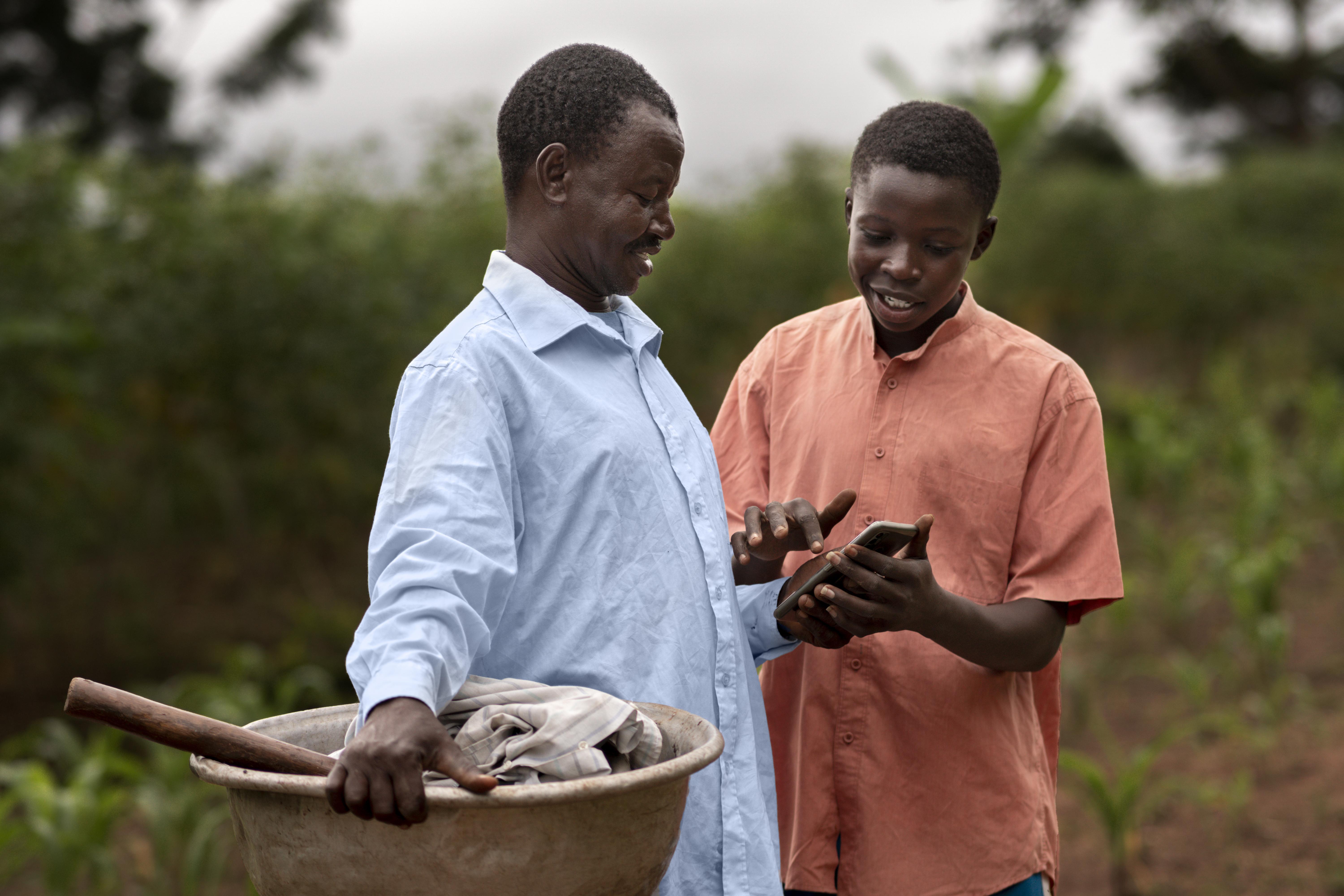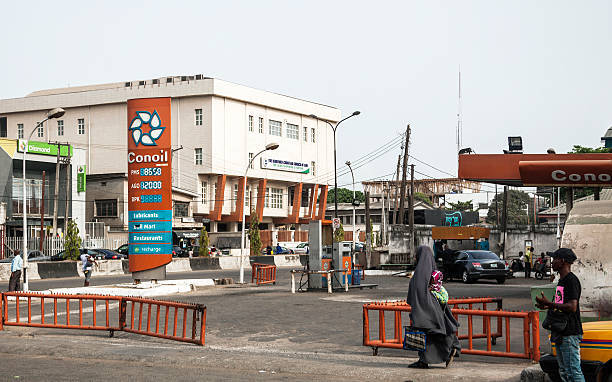Africa's sustainable future hinges on how everyday lives evolve. The continent's climate ambitions should not be policy only; they must be rooted in changing what, how, and why we consume, travel, eat, and build. These choices shape emissions and opportunities, carrying hope and risk for millions.
From Ghana's bike-sharing pilots to Lagos roofs newly covered in solar panels, the story beneath the numbers is a call for urgent, collective action and a reminder that African solutions must be African-led.
Africa's Choices: Climate Ambitions, Consumption Realities
Africa approaches a decisive juncture in climate action. While international reports warn that household consumption drives over 65% of global emissions, the African story is shaped by unique contrasts.
This includes a modest average lifestyle footprint, yet the continued looming impact of swelling middle classes and fast-changing consumer habits is shifting the continent's systems, infrastructure, and values is no longer simply desirable. Climate targets must have real meaning.
New findings, such as those in this report, bring to bear the challenge of climate change, which could cap per capita carbon at 2–2.5 tons by 2030, demanding immediate bold action, alongside nearly a tenfold reduction in elite emissions by 2050.
For Africa, success requires a dual approach, dramatically curbing luxury emissions among the privileged few, while designing pathways for the poorest to escape deprivation sustainably.
This redefines prosperity, placing sufficiency, dignity, and low-carbon growth ahead of unchecked consumption.
Policy ideas and behaviour patterns make headlines, but they are not enough. Only by fusing modern policy, cultural transformation, and robust infrastructure, from urban transit to energy grids, can new habits take root across societies. African expectations and voices must anchor every transition, ensuring climate justice is not sacrificed for distant international benchmarks.
To unlock lasting change, the continent must frame well-being first around opportunities before restraint, by investing in mobility, housing, and food systems that nurture people and planet alike. The decisions made today will shape Africa's climate legacy for generations.
Why African Lifestyles Matter for Climate Leadership
Africa's carbon footprint is a paradox; low on average but rising sharply in cities and upper-income communities.
If current global patterns persist, the top 10% will produce 36–49% of emissions, while billions remain underserved. African leaders must combat inequality: reducing elite excess while enabling fair access for all.
Lifestyle Emissions – Global Income Distribution vs. African Reality
| Income Group | Share of Emissions (Global) | African Pattern |
| Top 1% | ~15% | < 5% (mostly urban) |
| Top 10% | ~36–49% | Growing rapidly |
| Middle 40% | ~44% | Small, urbanizing |
| Bottom 50% | ~7–15% | Majority, rural |
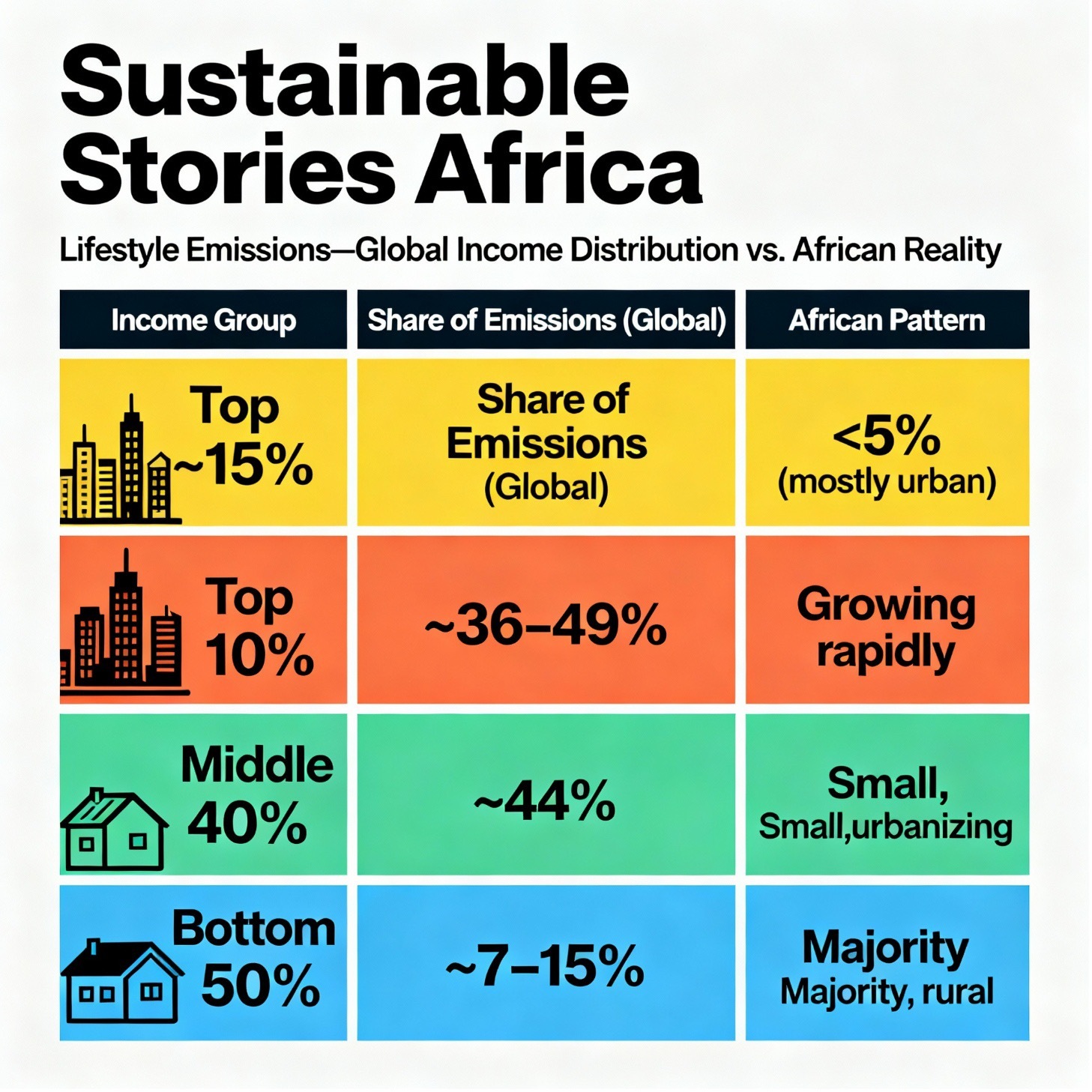
The avoidable risk: as prosperity grows, so does consumption-based climate impact, especially via travel, fuel, food, and building choices.
ASI Framework – Key Domains for Carbon Mitigation
The "Avoid–Shift–Improve" (ASI) framework guides practical climate decisions. For African cities and villages, this means:
- Avoid: Reduce superfluous energy use, long-haul travel, and overconsumption.
- Shift: Move towards active mobility (cycling, walking), public transport, and local diets.
- Improve: Upgrade appliances, building insulation, rooftop solar—make every kw/h count.
ASI Options by Sector (African Adaptation)
| Sector | Avoid | Shift | Improve |
| Mobility | Avoid flights, car use | Bike, walk, transit | Efficient vehicles, e-mobility |
| Residential | Limit space, energy | Green tariffs, solar, communal | Insulate; efficient devices |
| Food | Cut waste, sufficiency | Veg/plant-based, local diets | Organic, efficient cooking |
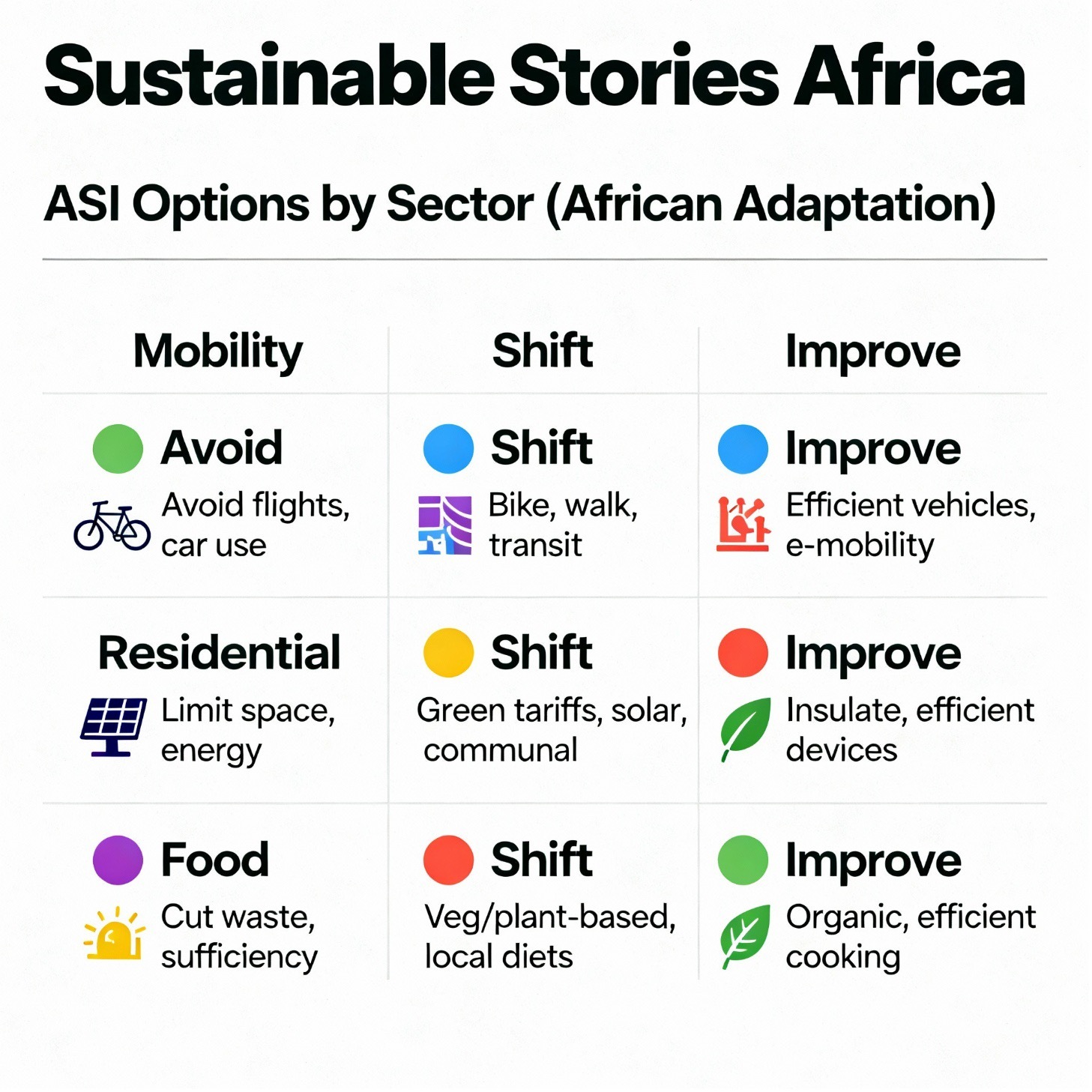
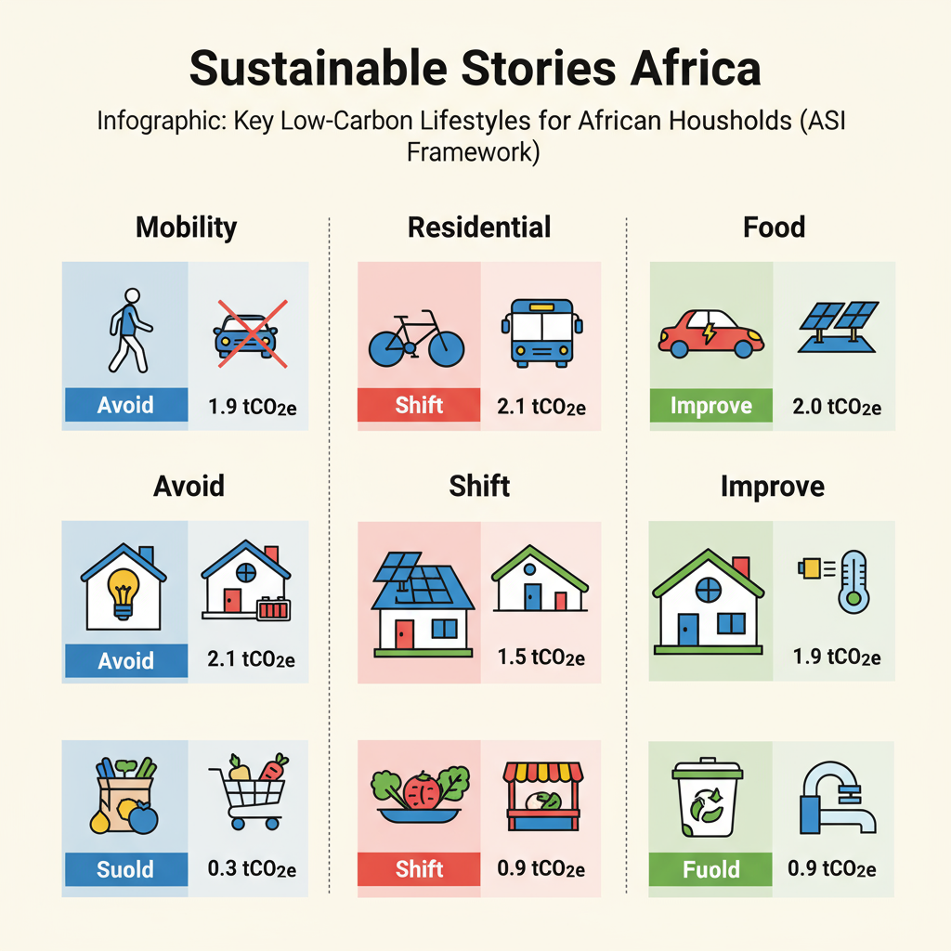
Mobility is the biggest lever; urban trips dominate carbon footprints for wealthier households, while rural access revolves around shared minibuses and walking.
In homes, simple practices (better insulation, efficient lights, solar kits) can halve energy emissions.
Food transitions, from meat-heavy to plant-rich diets, are important for urban elites and offer health dividends.
Reimagining Prosperity and African Well-Being
The African vision for climate leadership is built on sufficiency, equity, and opportunity, where reduced emissions are a side-effect of inclusive growth. Well-being must be redefined away from "more is better" to "enough for all." African innovation abounds; grassroots action can shift norms faster than legislation.
- Reducing travel for work via remote solutions, local economic clusters.
- Building resilient neighbourhoods, not sprawling car-centric cities.
- Enabling simple, smart home upgrades, from solar water heaters to cool-roof paints.
- Championing communal gardens, waste-free food hubs, resisting Western-style overconsumption.
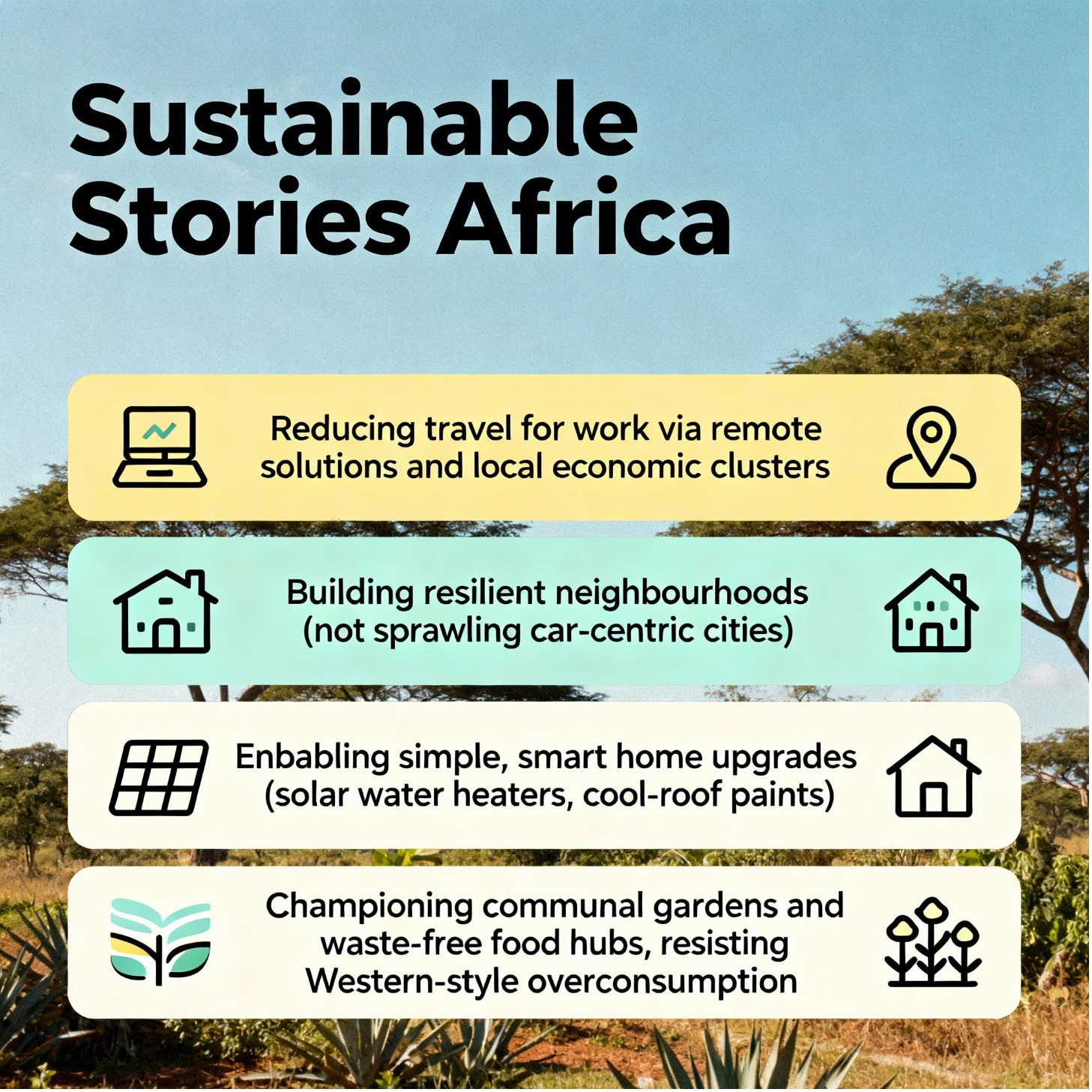
Africa does not need to emulate high-carbon Western lifestyles. Its strengths - community, modesty, and stewardship are leverage points for a climate-resilient future. Embracing sufficiency is not settling for less but building better.
Practical Steps – What Governments, Citizens, and Business Must Do
Policy alone is insufficient. Systems must support new choices:
- Invest in public transit, safe cycling, and non-motorised corridors in cities.
- Scale up solar and grid modernisation for homes and enterprises, especially outside capitals.
- Target food systems reform for sustainability—regulate waste, incentivise local and plant-rich diets.
- Use green finance to make energy efficiency affordable for all.
- Standardise low-carbon design (buildings, mobility, food), embed into codes.
- Empower youth and women as primary climate actors—with education, jobs, and community leadership.
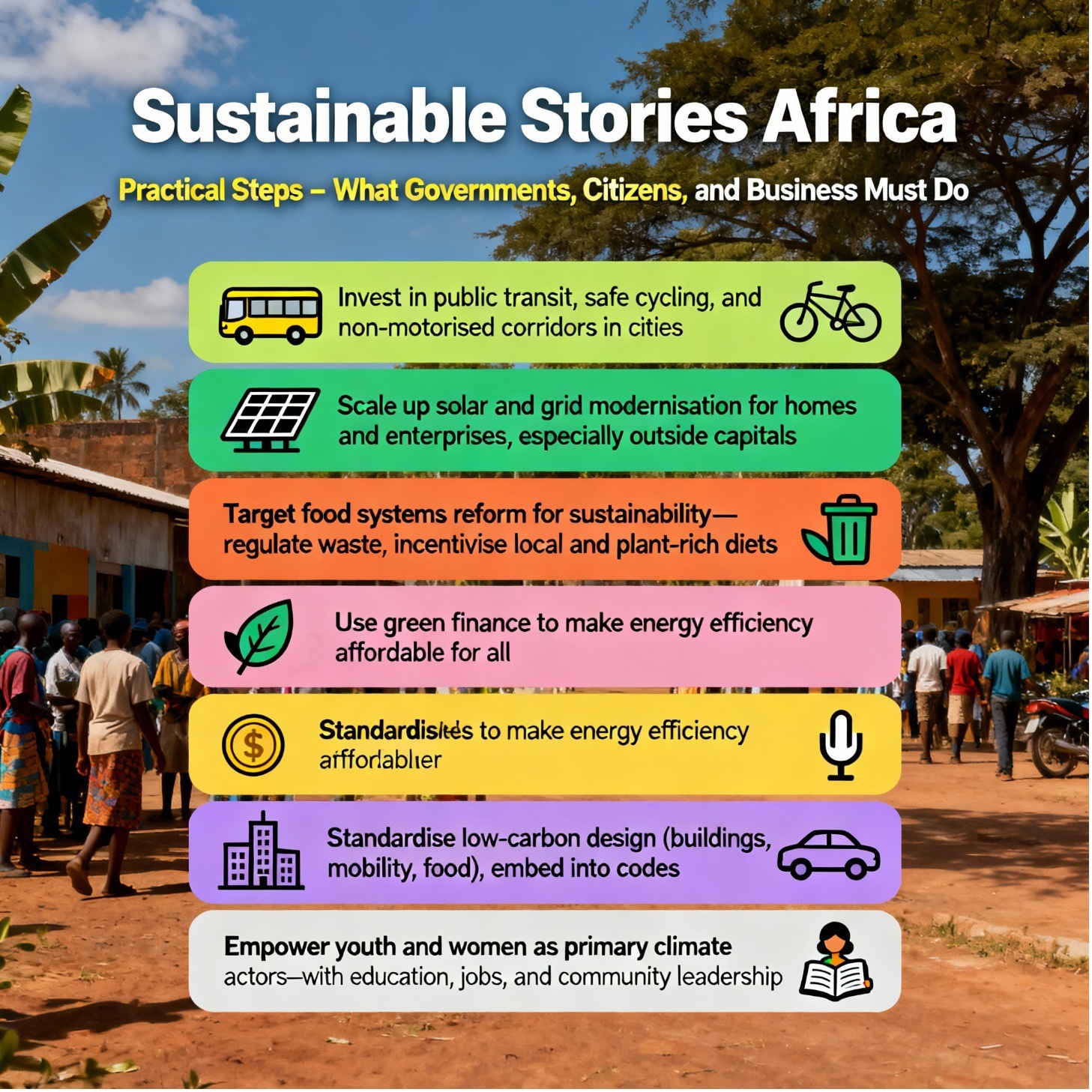
Roadmap – Sectoral Priorities for African Decarbonization (2025–2035)
Sector | Priority Actions | Potential Mitigation (tCO2e/year) |
Mobility | Transit, cycling, e-mobility, car-free policies | Up to 2.1 (urban)/0.8 (rural) |
Residential | Solar, cool roofs, efficiency, insulation | Up to 1.9 (all households) |
Food | National nutrition plans, local supply, waste bans | Up to 0.9 |
Cross-cutting | Green jobs, finance access, inclusive policies | Cumulative, long-term |
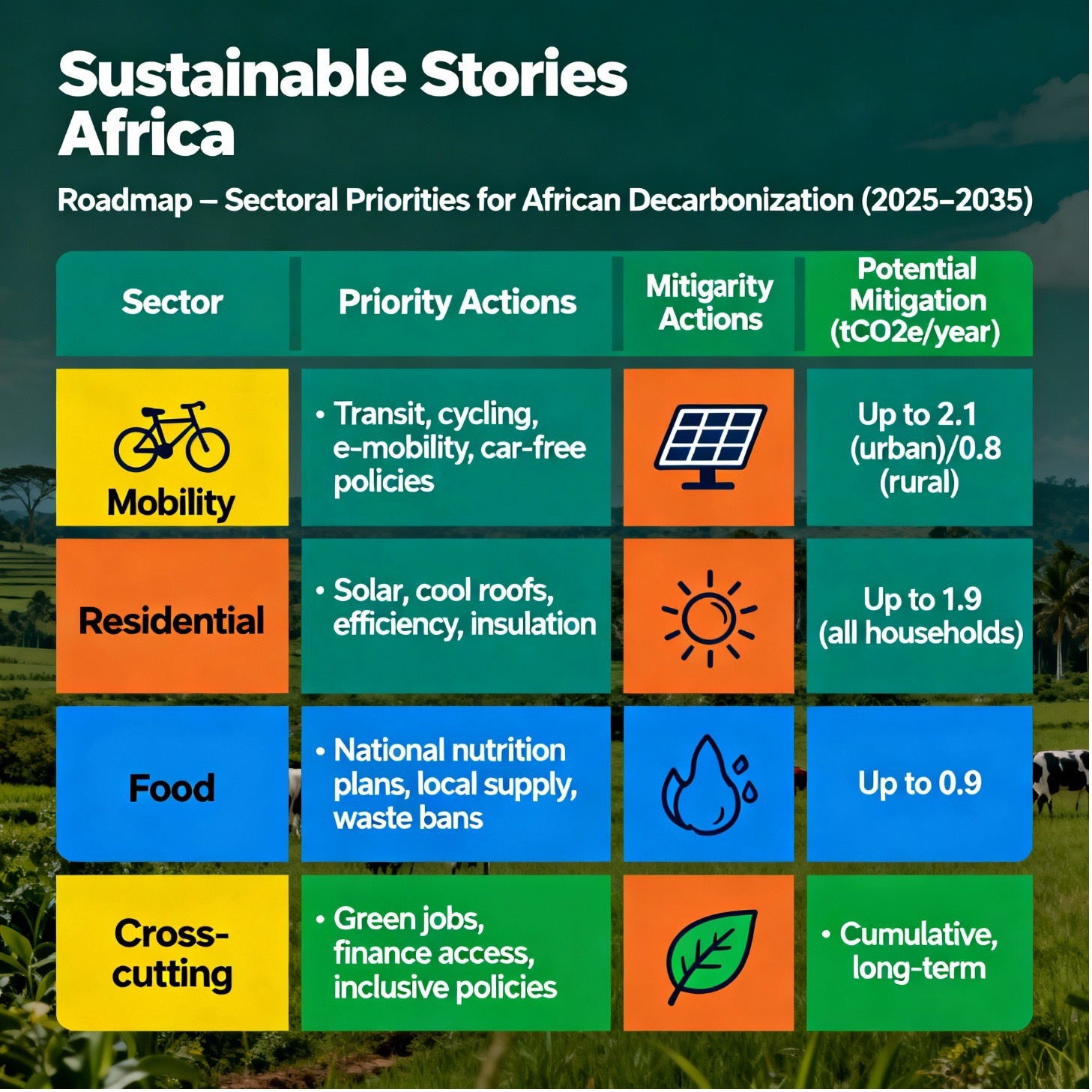
Africa's journey must be anchored in realities: informal settlements, rural poverty, urban youth unemployment. Solutions must fit, with flexibility for local context.
Path Forward: Priorities & Promises
Africa's sustainable leap rests on inclusive, low-carbon choices that serve both rich and poor, city and village. Policymakers, citizens, and businesses must work together, embedding sufficiency, resilience, and African innovation at every turn.
The promise: prosperity built on local leadership, communal action, and climate justice.
Enabling infrastructure, green finance, and cultural renewal can bridge intentions to impact, making net-zero a shared African reality, where climate ambition equals development ambition.

